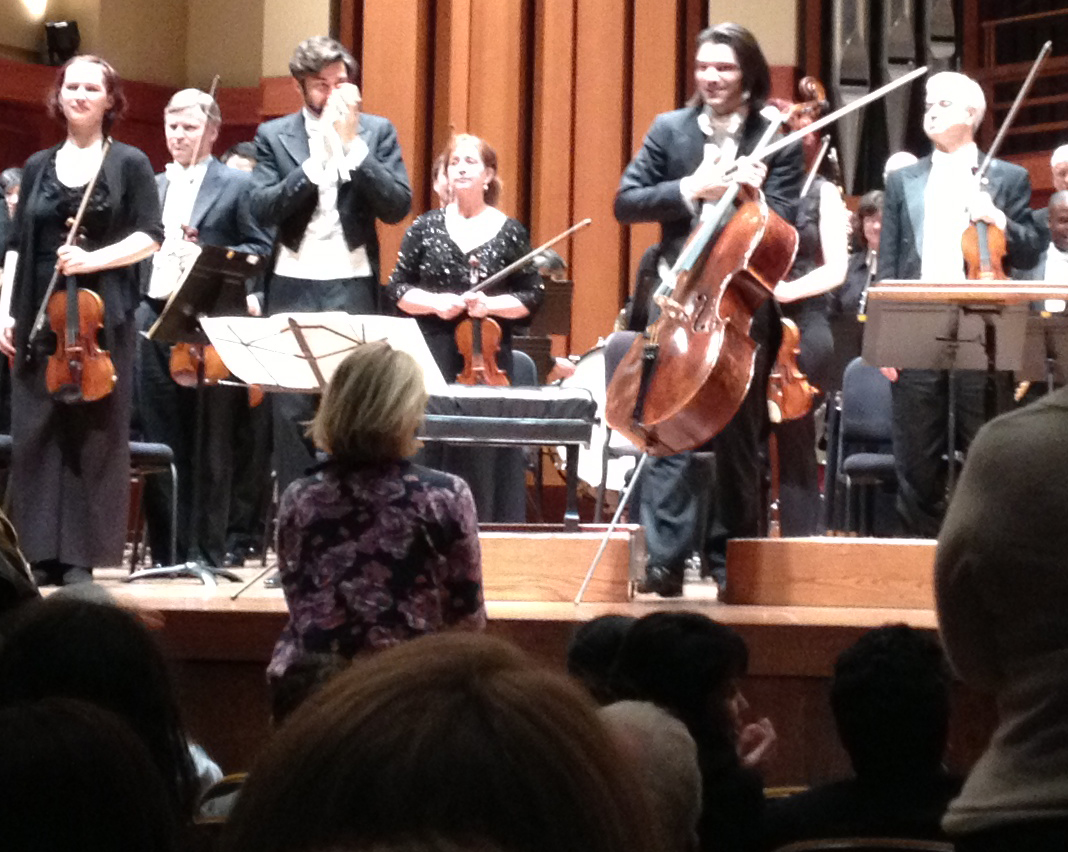Beethoven 5 and Gautier Capucon
March 24 2013My high school violin teacher once told me that she considered Mozart’s Fourth Violin Concerto the hardest concerto to play well in the entire violin repertoire. Mozart can look deceptively easy, but it can also be incredibly frustrating to make it sound good. So began the Seattle Symphony concert last night with Mozart’s Don Giovanni overture.
I’ve been very frustrated thus far in my experiences with the Seattle Symphony. To my eyes and ears, the orchestra is very inconsistent - both in talent and focus.
Tonight, in addition to Don Giovanni, they also played Britten’s Cello Symphony with Gautier Capucon and Beethoven 5. Beethoven 5 was definitely the draw for me - I’ve now seen the symphony played by the Minnesota Orchestra, the Chicago Symphony Orchestra, and the Seattle Symphony.
I’ll talk a little about the Britten first. I didn’t really know much about the piece going in. It has a very interesting beginning, with a dialogue between the solo cello and the bass section. Overall, it’s a very heavy, modern, and serious piece. It seemed like a very weird offering to play in between Don Giovanni and Beethoven 5.
This time, it was Celia’s turn to fall asleep*. The Britten is relentless - it’s 30 minutes of serious, dramatic music. It was difficult to follow the progression of movements (the last two are connected by a long cadenza). All in all, not my favorite, and not likely to be something I put on the playlist anytime soon.
*I made it the whole concert without falling asleep!
It’s hard for me to judge Capucon’s performance. I realized during the concert that I’d never seen anyone other than Yo-Yo Ma play a cello concerto live (I’ve been in the orchestra for a few solo cellists, but obviously wasn’t able to listen very carefully). Capucon doesn’t have Yo-Yo Ma’s huge, overwhelming tone. In addition, Capucon’s demeanor on stage is very withheld - that might be because of the nature of the piece.
I think it must be very hard for concert cellists to be compared to Yo-Yo Ma. While I thought Capucon overall was very good, I was semi-stunned by his decision to play with the music on a stand onstage. I don’t think I’ve ever seen any solo performer play with music before. In addition, the music wasn’t there for him to refer to occasionally - his eyes were locked in and focused on the stand pretty much the whole time. It definitely felt like Capucon wasn’t as engaged with the music around him.
Whether it was the music or the artist, the overall performance failed to capture the attention of the crowd. Capucon received a roughly a standing ovation from roughly 20-30%.

As for Mozart and Beethoven, I was underwhelmed. I’ll relay a few observations I made:
- At the beginning of Don Giovanni, the concertmaster entered slightly early on one of the chord entrances. The second violin principal looked over at her with a “WTF” face.
- For the Allego section of Don Giovanni, there were a few times where I could actually hear an echo from the string sections.
- The bowing style for Beethoven 5 was inconsistent. At the very beginning of the first movement, when the strings take turns trading off the theme dialogue, I saw some playing at the upper half of the bow and many others playing at the frog.
- There were a few violins that played an open E on chords in the last movement of the Beethoven. It was impossible not to notice those E strings sounding out.
- Finally, I saw something I’ve never seen before. In the middle of the last movement of the Beethoven, a first violinist stopped playing, put his instrument down, took a huge breath, before finally resuming playing. In all, he probably only took about a 5 second break, but it was right in the middle of notes!
It just feels like there was a lack of energy. I’ve always felt energized following the last movement. The slow buildup into the huge C major chord that marks the start of the last movement was surprisingly dull.
The crowd did give the performance a full standing ovation at the end. I wonder how many people were standing up for the Seattle Symphony, and how many were standing up for Beethoven.
comments powered by Disqus